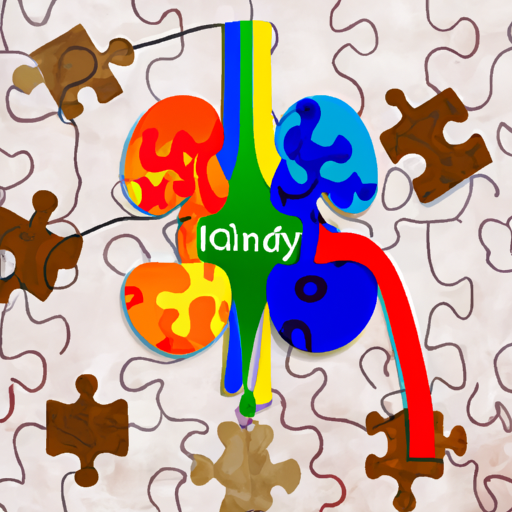Kidney failure is a serious medical condition that affects millions of people around the world. This article aims to provide a comprehensive understanding of kidney failure, including its causes, symptoms, and diagnosis. Furthermore, it explores the various treatment options available for managing this condition and discusses the importance of lifestyle changes and supportive therapies in improving the quality of life for individuals with kidney failure. Whether you or a loved one is facing this diagnosis, gaining knowledge about kidney failure is crucial in making informed decisions about treatment and care.
1. Understanding Kidney Failure: Causes, Symptoms, and Diagnosis
Kidney failure, also known as renal failure, is a serious medical condition that occurs when the kidneys are no longer able to function properly. This can lead to a buildup of toxins and waste products in the body, causing various complications. Understanding the causes, symptoms, and diagnosis of kidney failure is crucial for early detection and effective treatment.
There are two main types of kidney failure: acute and chronic. Acute kidney failure is often caused by a sudden and severe decrease in kidney function, which can be triggered by factors such as dehydration, blood loss, infections, or drug toxicity. Chronic kidney failure, on the other hand, develops gradually over time and is usually associated with underlying health conditions like diabetes, high blood pressure, or kidney diseases.
Regardless of the type, kidney failure shares some common symptoms. Fatigue, weakness, and a general feeling of illness are often experienced by individuals with kidney failure. Other common symptoms include decreased appetite, difficulty concentrating, swelling in the legs and feet, and changes in urine output. As the condition progresses, more severe symptoms may arise, such as nausea, vomiting, shortness of breath, and persistent itching.
To diagnose kidney failure, healthcare professionals employ various methods. A comprehensive medical history review is conducted to identify any risk factors or underlying conditions that may contribute to kidney problems. Physical examinations, blood tests, and urine tests are also essential to evaluate kidney function. These tests measure levels of creatinine and blood urea nitrogen (BUN) in the blood, which are waste products normally filtered out by the kidneys. Imaging tests like ultrasounds or CT scans may be used to assess the structure and size of the kidneys.
Early detection of kidney failure is crucial, as prompt treatment can help slow down the progression of the disease and prevent further damage. Treatment options for kidney failure vary depending on the underlying cause and the severity of the condition. In some cases, the primary goal is to manage the symptoms and slow down the progression of the disease. Lifestyle changes, including a healthy diet, regular exercise, and avoiding smoking and excessive alcohol consumption, can help support kidney function.
In more severe cases, dialysis or kidney transplantation may be necessary. Dialysis is a procedure that removes waste products and excess fluids from the blood when the kidneys are unable to do so. It can be performed either through hemodialysis, where a machine filters the blood, or peritoneal dialysis, where a special fluid is introduced into the abdominal cavity to remove waste. Kidney transplantation involves surgically replacing a failed kidney with a healthy one from a donor.
In conclusion, kidney failure is a condition that requires prompt diagnosis and appropriate treatment. Understanding the causes, symptoms, and diagnostic procedures associated with kidney failure is crucial for early intervention. By addressing the underlying causes and managing symptoms effectively, individuals with kidney failure can lead fulfilling lives and minimize the risk of complications.
2. Treating Kidney Failure: Explore the Options and Treatment Approaches
Treating Kidney Failure: Explore the Options and Treatment Approaches
Kidney failure, also known as end-stage renal disease (ESRD), is a serious condition that requires prompt and effective treatment to preserve the patient’s health and improve their quality of life. The treatment approach for kidney failure depends on various factors, including the underlying cause, the severity of the condition, and the patient’s overall health.
When it comes to treating kidney failure, the primary goal is to replace the lost kidney function and manage any complications that may arise. There are several treatment options available, including:
1. Dialysis: Dialysis is a procedure that helps filter waste products, excess fluids, and toxins from the bloodstream when the kidneys are no longer able to perform this function effectively. There are two main types of dialysis: hemodialysis and peritoneal dialysis. Hemodialysis involves using a machine to filter the blood, while peritoneal dialysis uses the body’s natural filtering membrane, the peritoneum, to remove waste products.
2. Kidney Transplantation: Kidney transplantation is considered the best treatment option for patients with kidney failure. It involves replacing a failed kidney with a healthy kidney from a living or deceased donor. A successful transplant can restore kidney function and eliminate the need for dialysis. However, finding a suitable donor and undergoing transplant surgery involves a complex evaluation process and post-transplant care.
3. Medications: Medications play a crucial role in managing kidney failure and its associated complications. Depending on the specific condition, medications may be prescribed to control high blood pressure, reduce swelling, regulate electrolyte levels, and prevent complications such as anemia and bone disease. Additionally, immunosuppressant drugs are prescribed to prevent organ rejection after kidney transplantation.
4. Dietary and Lifestyle Changes: Making certain dietary and lifestyle modifications can significantly improve the overall health and well-being of individuals with kidney failure. This may include reducing sodium and potassium intake, limiting phosphorus-rich foods, monitoring protein consumption, and staying hydrated. Regular exercise, quitting smoking, and avoiding excessive alcohol consumption are also crucial for managing kidney failure effectively.
5. Symptom Management: Kidney failure often causes a range of symptoms, including fatigue, loss of appetite, nausea, itching, and difficulty concentrating. Medications and other interventions can be used to manage these symptoms and improve the patient’s comfort and quality of life.
It is important to note that the choice of treatment for kidney failure is highly individualized, taking into account the patient’s overall health, age, lifestyle factors, and personal preferences. A multidisciplinary healthcare team, consisting of nephrologists, transplant surgeons, dietitians, and psychologists, among others, collaborate to develop a comprehensive treatment plan tailored to each patient’s unique needs.
In conclusion, the treatment of kidney failure involves a range of options and approaches aimed at replacing lost kidney function and managing associated complications. Whether through dialysis, kidney transplantation, medications, dietary changes, or symptom management, the primary objective is to improve the patient’s well-being and enhance their quality of life. It is vital for individuals with kidney failure to work closely with their healthcare team to determine the most suitable treatment approach for their specific condition.
You can find out more about this theme here: https://bbgate.com/tags/bmk/.
3. Managing Kidney Failure: Lifestyle Changes and Supportive Therapies for a Better Quality of Life
Managing Kidney Failure: Lifestyle Changes and Supportive Therapies for a Better Quality of Life
Kidney failure, also known as end-stage renal disease (ESRD), is a serious condition that requires ongoing management to maintain a good quality of life. While treatment options like dialysis and kidney transplantation are commonly used, lifestyle changes and supportive therapies play a crucial role in managing kidney failure.
One of the key aspects of managing kidney failure is adopting a healthy lifestyle. This includes following a balanced diet, maintaining a healthy weight, and monitoring fluid intake. A dietitian or nutritionist can help develop a personalized meal plan that is low in sodium, phosphorus, and potassium, which are substances that the kidneys may struggle to eliminate. Additionally, limiting the intake of processed foods, alcohol, and caffeine is recommended.
Regular physical activity is also important for individuals with kidney failure. Engaging in moderate exercise, such as walking or swimming, can help improve overall fitness, maintain a healthy weight, and reduce the risk of developing other health conditions such as heart disease and diabetes. However, it is essential to consult with a healthcare professional before starting any exercise regimen to ensure it is safe and appropriate.
Moreover, managing stress levels is vital for individuals with kidney failure. Chronic stress can negatively impact physical and mental health, potentially worsening kidney function. Techniques such as deep breathing exercises, meditation, and yoga can help reduce stress and promote relaxation. Support from family, friends, or support groups can also provide emotional support and help individuals cope with the challenges of kidney failure.
In addition to lifestyle changes, supportive therapies can significantly improve the quality of life for individuals with kidney failure. These therapies focus on managing symptoms, preventing complications, and maintaining overall well-being. Medications are often prescribed to control blood pressure, reduce swelling, and regulate electrolyte levels. Regular check-ups with healthcare professionals are necessary to monitor kidney function, adjust medications, and detect any potential complications early on.
It is important to note that managing kidney failure requires consistent adherence to medical recommendations and lifestyle changes. Compliance with medication regimens, regular follow-up appointments, and self-monitoring of blood pressure and blood sugar levels are crucial. It is also essential to avoid smoking and limit alcohol consumption as these habits can further damage the kidneys.
Kidney failure is a life-altering condition, but with proper management, individuals can lead fulfilling lives. By making necessary lifestyle changes, seeking emotional support, and adhering to medical recommendations, the impact of kidney failure on daily life can be minimized. With a proactive approach to self-care and support from healthcare professionals, individuals with kidney failure can improve their overall quality of life and maintain a sense of normalcy.

